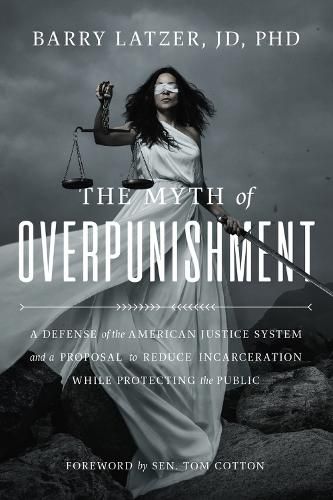Readings Newsletter
Become a Readings Member to make your shopping experience even easier.
Sign in or sign up for free!
You’re not far away from qualifying for FREE standard shipping within Australia
You’ve qualified for FREE standard shipping within Australia
The cart is loading…






Justice is on trial in the United States. From police to prisons, the justice system is accused of overpunishing. It is said that too many Americans are abused by the police, arrested, jailed, and imprisoned. But the denunciations are overblown. The data indicates, contrary to the critics, that we don’t imprison too many, nor do we overpunish. This becomes evident when we examine the crimes of prisoners and the actual time served. The history of punishment in the United States, discussed in vivid detail, reveals that the treatment of offenders has become progressively more lenient. Corporal punishment is no more. The death penalty has become a rarity. Many convicted defendants are given no-incarceration sentences. Restorative justice may be a good thing for low-level offenses, or as an add-on for remorseful prisoners, but when it comes to major crimes it is no substitute for punitive justice. The Myth of Overpunishment presents a workable and politically feasible plan to electronically monitor arrested suspects prior to adjudication (bail reform), defendants placed on probation, and parolees.
$9.00 standard shipping within Australia
FREE standard shipping within Australia for orders over $100.00
Express & International shipping calculated at checkout
Justice is on trial in the United States. From police to prisons, the justice system is accused of overpunishing. It is said that too many Americans are abused by the police, arrested, jailed, and imprisoned. But the denunciations are overblown. The data indicates, contrary to the critics, that we don’t imprison too many, nor do we overpunish. This becomes evident when we examine the crimes of prisoners and the actual time served. The history of punishment in the United States, discussed in vivid detail, reveals that the treatment of offenders has become progressively more lenient. Corporal punishment is no more. The death penalty has become a rarity. Many convicted defendants are given no-incarceration sentences. Restorative justice may be a good thing for low-level offenses, or as an add-on for remorseful prisoners, but when it comes to major crimes it is no substitute for punitive justice. The Myth of Overpunishment presents a workable and politically feasible plan to electronically monitor arrested suspects prior to adjudication (bail reform), defendants placed on probation, and parolees.